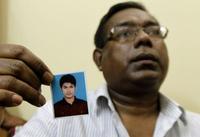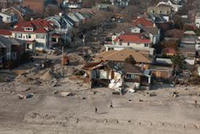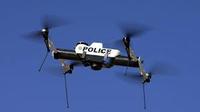-
Florida restricts the use of drones by law enforcement agencies
States continue to restrict the use of drones by law enforcement agencies. Florida police agencies wanted state lawmakers to make a special exception in a bill which bans the use of UAVs by law enforcement, so that drones could be used for crowd control. The bill, however, won the approval of the Senate Community Affairs Committee without the exception.
-
-
Iowa implements Real ID act, but other states hold firm in opposition
Last month Iowa joined other states in implementing the REAL ID Act, which Congress passed in 2005 in an effort to combat terrorism in the aftermath of 9/11. The intense debate over the act continues, though: twenty-five states have passed resolutions rejecting REAL ID, with fifteen of them going as far as to make it illegal to comply with the act.
-
-
Bangladeshi man pleads guilty to trying to blow up the Federal Reserve Bank building

A Bangladeshi man who triedattempted to use a weapon of mass destruction to blow up the New York Federal Reserve Bank has pleaded guilty to the charges. Under the plea agreement, he will faces up to life in prison.
-
-
New internally cured concrete increases bridge life span
Concrete is normally made by mixing portland cement with water, sand, and stone. In the curing or hardening process, water helps the concrete mixture gain strength by reacting with the cement. Traditionally, curing is promoted by adding water on top of the bridge deck surface. The new technology for internal curing provides additional water pockets inside the concrete, enhancing the reaction between the cement and water, which adds to strength and durability. This new technology is enabling Indiana to improve bridges in the state with a new “internally cured” high-performance concrete.
-
-
DNA sequencing a serious risk to privacy
The growing ease of DNA sequencing has led to enormous advancements in the scientific field. Through extensive networked databases, researchers can access genetic information to gain valuable knowledge about causative and preventative factors for disease, and identify new targets for future treatments. The wider availability of such information, however, also has a significant downside — the risk of revealing personal information. New study finds that new policies are needed to safeguard participants’ identity in genetic studies.
-
-
NY to buy, demolish beachfront homes, make way for storm buffers

New York governor Andrew Cuomo plans to use $400 million in federal funding to buy beachfront homes as part of a broader plan to reshape the New York coastline so the state is better prepared for sea level rise, surges, and storms. The plan is to raze the purchased homes and leave to shore front vacant. Some properties would be turned into dunes, wetlands, or other natural buffers. Other parcels could be combined and turned into public parkland.
-
-
More states consider laws to limit the use of drones by police

The Federal Aviation Administration (FAA) appears ready to allow the use of drones in the United States, by both law enforcement agencies and private citizens, almost with no restrictions. Experts predict that by the end of the decade, there will be about 30,000 drones flying over the United States. Legislators in at least eleven states want to impose limits on the use of UAVs as worries grow that the unregulated use of drones would erode the liberties of Americans.
-
-
Massachusetts moves against unscrupulous compounding pharmas
State regulators in Massachusetts have shut down or cited thirty-two of the state’s forty compounding pharmacies as a result of a nationwide fungal meningitis outbreak. The outbreak killed forty-five people and sickened 696, who required hospitalization.
-
-
Miles tax may soon replace gas tax as a way to fund infrastructure maintenance
With infrastructure around the country in a state of disrepair, many states and lawmakers are trying to find a way to fund improvement of roads and bridges. The federal gasoline tax brings in fewer dollars each year, and now some lawmakers and transportation experts are considering the idea of taxing citizens by how far they drive each year instead of the amount of gasoline they buy each year.
-
-
Springfield, Illinois, faces infrastructure woes
As is the case with other cities, the infrastructure of Illinois’ capital, Springfield, is decaying. Experts told the city council that it would take $86.6 million over the next three years to shore up the city’s streets and sewer system, and $22.5 million a year thereafter to maintain it. The city is now grappling with how to raise the necessary funds.
-
-
December, January the top two months in terms of gun purchases in U.S.
New figures released by the FBI show that Americans, during December and January, have been buying guns in record numbers. Analysts say that behind the surge in gun purchases are two events: the Newtown, Connecticut mass shooting and the moves by the Obama administration to introduce – and, in the case of assault weapons, reintroduce – gun control measures. The FBI figures show that in January, the agency performed 2,495,440 gun background checks, initiated by gun sellers before they sold a gun to a customer.
-
-
U.S. cyberstrikes against adversaries to require presidential authority
Under a new administration policy, the president would have the authority to order a pre-emptive cyberattack against an adversary if the United States receives credible evidence of a major cyberattack being planned against the country from overseas. So far, the administration is known to have launched a sustained cyberattack only once – against Iran’s uranium enrichment facilities – in an operation code-named Olympic Games.
-
-
Labor unions join campaign for immigration reform
The immigration reform debate continues to grab the headlines, and labor unions are now entering the ring, hoping that organizing immigrant workers can boost the unions’ shrinking ranks.
-
-
Number of Muslim-Americans involved in domestic terrorism “vanishingly small”
The number of Muslim-Americans planning or perpetrating terror plots has always been exceedingly small – and it is declining. Fourteen Muslim-Americans were indicted for violent terrorist plots in 2012, down from twenty-one the year before. For the second year in a row, there were no fatalities or injuries from Muslim-American terrorism. For comparison: the United States suffered approximately 14,000 murders in 2012. Since 9/11, Muslim-American terrorism has claimed thirty-three lives in the United States. During the same period, there were more than 180,000 murders committed in the United States.
-
-
Facebook new search feature has cyber experts worried
A new Facebook search feature has security experts concerned. They are warning users of the site to strengthen their security settings to avoid embarrassment and to protect themselves from cybercriminals.
-
More headlines
The long view
Factories First: Winning the Drone War Before It Starts
Wars are won by factories before they are won on the battlefield,Martin C. Feldmann writes, noting that the United States lacks the manufacturing depth for the coming drone age. Rectifying this situation “will take far more than procurement tweaks,” Feldmann writes. “It demands a national-level, wartime-scale industrial mobilization.”
No Nation Is an Island: The Dangers of Modern U.S. Isolationism
The resurgence of isolationist sentiment in American politics is understandable but misguided. While the desire to refocus on domestic renewal is justified, retreating from the world will not bring the security, prosperity, or sovereignty that its proponents promise. On the contrary, it invites instability, diminishes U.S. influence, and erodes the democratic order the U.S. helped forge.
Fragmented by Design: USAID’s Dismantling and the Future of American Foreign Aid
The Trump administration launched an aggressive restructuring of U.S. foreign aid, effectively dismantling the United States Agency for International Development (USAID). The humanitarian and geopolitical fallout of the demise of USAID includes shuttered clinics, destroyed food aid, and China’s growing influence in the global south. This new era of American soft power will determine how, and whether, the U.S. continues to lead in global development.
Water Wars: A Historic Agreement Between Mexico and US Is Ramping Up Border Tension
As climate change drives rising temperatures and changes in rainfall, Mexico and the US are in the middle of a conflict over water, putting an additional strain on their relationship. Partly due to constant droughts, Mexico has struggled to maintain its water deliveries for much of the last 25 years, deliveries to which it is obligated by a 1944 water-sharing agreement between the two countries.
How Disastrous Was the Trump-Putin Meeting?
In Alaska, Trump got played by Putin. Therefore, Steven Pifer writes, the European leaders and Zelensky have to “diplomatically offer suggestions to walk Trump back from a position that he does not appear to understand would be bad for Ukraine, bad for Europe, and bad for American interests. And they have to do so without setting off an explosion that could disrupt U.S.-Ukrainian and U.S.-European relations—all to the delight of Putin and the Kremlin.”
How Male Grievance Fuels Radicalization and Extremist Violence
Social extremism is evolving in reach and form. While traditional racial supremacy ideologies remain, contemporary movements are now often fueled by something more personal and emotionally resonant: male grievance.
